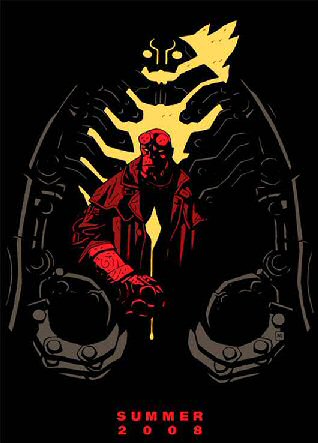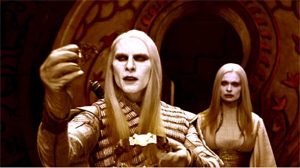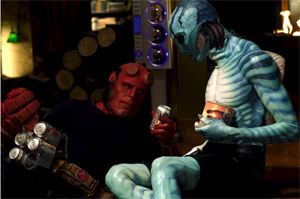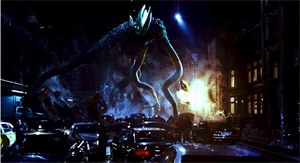Hellboy
II:
The Golden Army
At his best, Guillermo Del Toro creates
dream worlds on screen. Nothing gets held back from his
imagination, and it makes him a perfect interpreter of the
comic book creator Mike Mignola, another artist who puts
everything he likes into the mix and comes out with brilliance
like The Amazing Screw-On Head and, of course, Hellboy.
Up the budget, and it gets even wilder.
There are moments in Hellboy II: The Golden Army
that perfectly capture a dream state, and Del Toro also
makes use of a variety of techniques to communicate the
very power of imagination.
The film opens with a bedtime story for
the 11-year-old Hellboy. Ensconced in a Quonset hut on Christmas
Eve and obsessed with Howdy Doody, the kid would pass as
any red-blooded American boy, except for the skin, the horns
and the piercing yellow eyes.
His "father" Professor Bruttelheim (John
Hurt) reads to his adopted son from an arcane story book,
and the tale of the Golden Army unfolds in the form of wooden
puppets, just like the freckle-faced cowboy puppet Hellboy
insists is real. Del Toro puts us right inside the demon
child's head, and if you think the bedtime story is inappropriately
dark, please again note that this is Hellboy.
When the faerie realm gets revisited in
modern day, it's keenly designed and endlessly inventive.
Lifting off from where Pan's Labyrinth left, Del
Toro and his designers keep surprises waiting everywhere
you look. The biggest surprise may be that a former boy
band singer, Luke Goss, turns in a chilling yet sympathetic
performance as the elven Prince Elri - er, Nuada.
For Del Toro, like many another director
of the fantastic, has sympathy for his monsters. It's not
just that this is nominally about a demonspawn who chooses
to fight for humanity. The Golden Army expresses
the concern that when we have lost our ability to wonder,
perhaps the wondrous have a right to strike back and fight
for their place.
So wondrous is that world, however, that
it takes a while to adjust to the members of the Bureau
of Paranormal Research and Defense. Moving along from the
events of the previous Hellboy film, Del Toro turns
the BPRD into a sitcom, at first a harsh contrast to the
stately melancholy that Prince Nuada's quest has.
It's a delicate balance, and one of the
appeals of the Hellboy character -- again played by the
only man who could, Ron Perlman - is that he wants so badly
to be a normal joe. This time around, even the aquatic Abe
Sapien (Doug Jones) develops a bit of that yearning, having
shared insights with Nuada's luminous twin sister Nuala
(Anna Walton).
Neither of them can quite see that the
normal humans around them aren't that interesting. Several
anonymous BPRD agents serve as cannon fodder in a battle
against tooth fairies and other dark beasties, but Hellboy's
main "normal" contact is the unctuous Tom Manning (Jeffrey
Tambor), more simpering bureaucrat than real man.
That theme gets a little heavy-handed when
the ectoplasmic man Johann Krauss (Seth MacFarlane) steps
in to assume command. Though MacFarlane actually tries to
be subtle in his vocal characterization, the script just
won't let him. Hellboy immediately makes the connection
to Nazism, a few jokes get made at the expense of his accent,
and he makes a character shift that serves the plot and
theme, but not the actual character.
Still, this film plays more strongly than
the first. It's easy to get swept along in the action, which
Del Toro rarely lets flag. He's not quite as enamored of
his creations this time around, which leaves us wanting
more of them, of course, but also makes sure it's worth
watching The Golden Army a second or third time to
catch more.
The editing, by Bernat Vilaplana, has a
bit of jerkiness to it, which could either be a problem
or just adding to a vague unsettling feeling while watching.
Then again, Hellboy himself is constantly vaguely unsettled.
You can see that reflected in Perlman's
eyes. He's having fun, and he knows this is the role of
a lifetime. So deeply does he sink into Hellboy that it's
jarring seeing publicity photos of his normal face.
Another actor getting the chance of a lifetime
is Jones, finally playing a major character fully. This
time he gets to voice Abe Sapien, not just embody him. In
addition, he plays a couple of other denizens of the supernatural
world, underscoring his strange grace as an actor.
It all sweeps toward an inevitable Hellboy
III, but not in an unsatisfying cliffhanger way. Clearly,
Del Toro has planted seeds (of destruction) that he wants
to see bear fruit, and The Golden Army makes a case
that we should want to see them, too.
|









